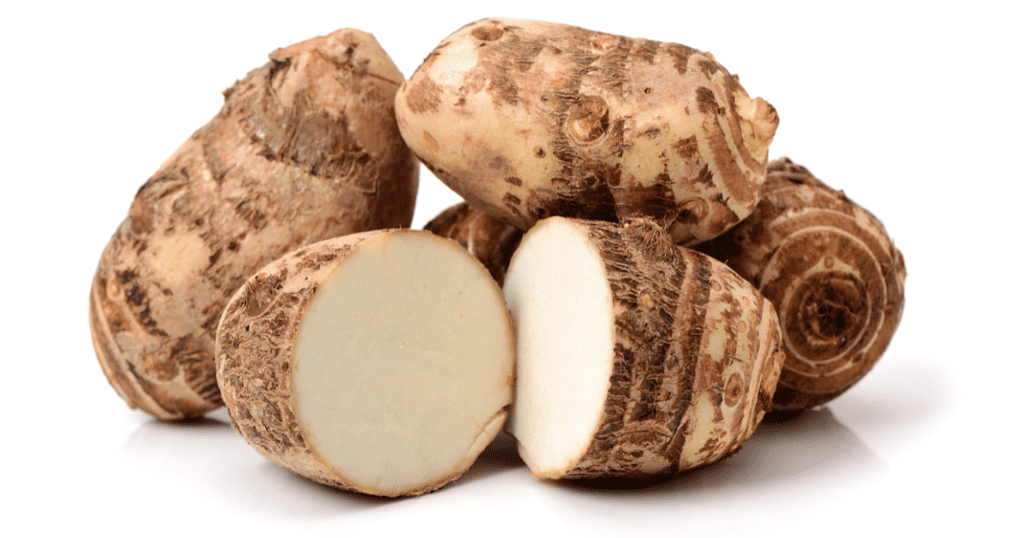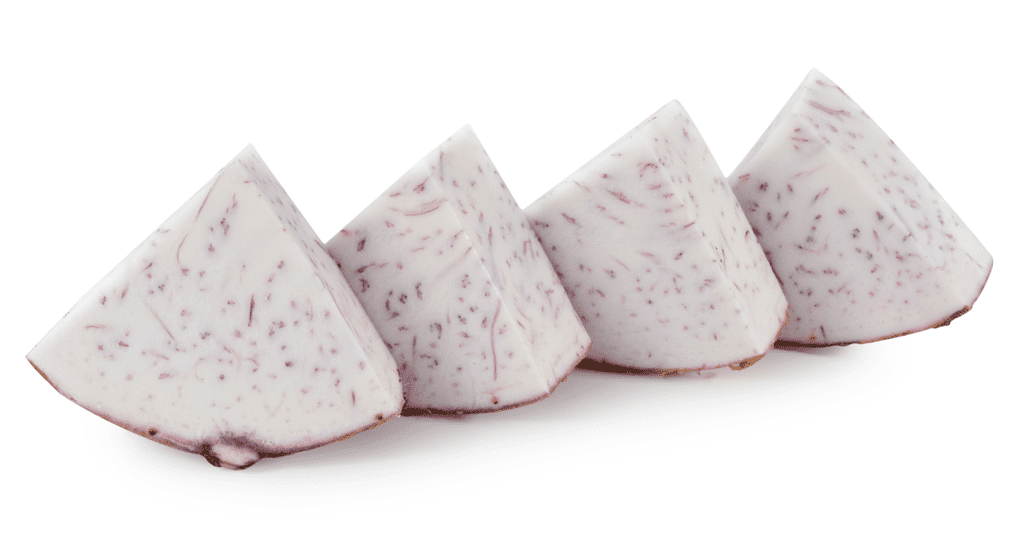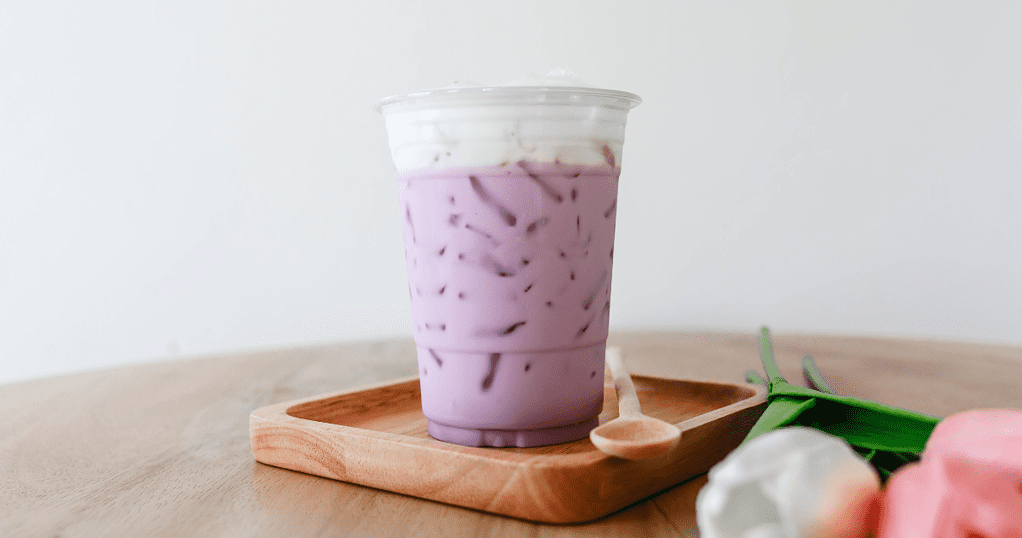Taro milk tea, a type of bubble tea, has become a popular drink in recent years, due to its unique taste and texture. But is taro milk tea healthy and good for you? In this blog post, we’ll explore taro milk tea’s nutritional value and potential health benefits. From its antioxidant content to its potential effects on weight and cholesterol levels, we’ll be uncovering the truth behind this tasty creamy drink. So, keep reading to find out if taro milk tea is healthy and if it is a good choice for you.
What is Taro Milk Tea?

Taro milk tea, or taro bubble tea, is a popular Taiwanese beverage that is made with tea, taro powder, and sweetener. The taro powder comes from the taro plant’s root, a tropical starchy root vegetable, similar to a sweet potato. It is native to Southeast Asia and the Caribbean and has a sweet, nutty flavor, and smooth, creamy texture. Taro is rich in vitamins, minerals, and dietary fiber. Taro powder is also high in antioxidants, which makes it a healthier option than other sugary beverages.
Taro milk tea is made by mixing the taro powder with a liquid sweetener such as honey or agave syrup. Tea is then added to the mixture and it is shaken or stirred until it is fully blended. Then, ice cubes, fresh milk, or other dairy products can be added to create the desired texture and flavor.
It is typically served with large tapioca pearls at the bottom of the cup, known as “boba”. And as such, it’s often called boba tea. Taro boba tea can be served hot or cold, with a variety of toppings to choose from. Boba tea shops use different teas including black tea, green tea, oolong tea, or jasmine tea. Although fresh taro root has white flesh, taro milk bubble tea is usually a beautiful purple color due to boba shops adding either food coloring or Ube (purple yam).
Taro milk tea is a great way to cool down during the hot summer months and has become a popular choice for cafes and restaurants. It is also a great pick-me-up for anyone who is looking for an alternative to coffee and tea. Plus, it is an excellent choice for people on special diets since it is naturally gluten-free.
Nutritional Facts of Taro Milk Tea

What exactly is in taro milk tea? Here’s a closer look at its nutritional information.
Calorie and Sugar Content
One 8-ounce serving of taro milk tea contains about 140 calories and 11 grams of sugar. The sugar content comes from the added sugars, as well as the sugar naturally present in the milk. While this may sound like a lot of sugar, the amount of sugar found in taro milk tea is lower than what is found in many other popular sweetened beverages. For example, a can of regular soda contains 37 grams of sugar,over three times more sugar.
Protein, Fat, and Carbohydrate Content
A cup of taro bubble tea contains 0.6 grams of protein, 0.3 grams of fat, and 34 grams of carbohydrates per 8-ounce serving. The fat content is mostly from the milk, while the carbohydrates come from the taro root and milk.
Vitamin and Mineral Content
Taro milk tea is a great source of several essential vitamins and minerals. Eight ounces contain 2% of your daily value of calcium, 2% of your daily value of iron, 1% of your daily value of vitamin D, and 1% of potassium. It’s also a good source of magnesium and other minerals.
Caffeine Content
There are about 24 milligrams of caffeine which is less caffeine in a cup of regular coffee. According to the US Food and Drug Administration,400 mg of caffeine a day is safe. So you’re not likely to experience any side effects from the caffeine.
Health Benefits of Taro Milk Tea

Did you know that this delicious treat can offer a range of health benefits too? From its antioxidant properties to its potential energy boost, taro milk tea could be your go-to drink for better overall health.
Antioxidant Properties
Taro milk tea contains both taro root and milk, and both are packed with antioxidants. Antioxidants protect our bodies from oxidative damage, which can lead to a range of health issues.
Taro root is also rich in polyphenols, which are powerful antioxidants that can help protect against cancer, heart disease, and other chronic diseases. Milk, meanwhile, is rich in calcium and other nutrients that can help protect against a range of health issues.
Potential Energy Boost
Taro milk tea is a great option if you’re looking for a natural energy boost. Taro root is a good source of complex carbohydrates and fiber, both of which can help provide sustained energy throughout the day and curb your appetite. Milk is also a good source of protein, which can help keep hunger at bay and provide the body with the energy it needs to function optimally.
Potential Mental Clarity Improvements
Taro milk tea is also a great source of antioxidants like polyphenols and vitamins A and E, both of which can help improve mental clarity and focus. The combination of these two nutrients can help protect against cognitive decline and improve mood.
Low-Calorie and Sugar Alternative to Other Beverages
Taro milk tea is a great alternative to other sugary and calorie-laden beverages. It’s lower in calories nd sugar than other popular sugary drinks. Plus, it’s a great source of beneficial nutrients like antioxidants and vitamins.
Possible Anti-Inflammatory Properties
Taro milk tea may also have some anti-inflammatory properties. The antioxidants found in both taro root and milk can help reduce inflammation in the body, which can help reduce pain and protect against a range of diseases.
Possible Digestive Benefits
Taro milk tea may also offer some digestive benefits. The combination of taro root and milk can help improve digestion and help the body absorb more nutrients from food.

Possible Weight Loss Benefits
Taro milk tea is also an excellent option for those trying to lose weight. It’s low in calories and the combination of high-fiber taro root and milk can help keep hunger at bay. You can still satisfy your sweet tooth while still getting some health benefits.
May Help Reduce the Risk of Diabetes and Heart Disease
Taro milk tea is a great source of antioxidants, vitamins, and minerals, all of which can help reduce the risk of diabetes and heart disease. The antioxidants found in taro root can help protect against oxidative damage, which can lead to a range of serious health issues.
Health Risks Associated with Taro Milk Tea

Like many other foods and drinks, there are some health risks associated with taro milk tea that should be considered before indulging.
Risk of Increased Blood Sugar Levels
One of the most common health risks associated with taro milk tea is an increase in blood sugar levels. It typically contains a large amount of sugar, which can lead to elevated blood sugar levels.
This can cause a variety of problems, such as an increased risk of diabetes, heart disease, and stroke. Furthermore, the high amount of sugar can contribute to weight gain, which can lead to obesity. Therefore, if you’re going to indulge in taro milk tea, it’s important to do so in moderation or opt for a sugar-free version.
Risk of Caffeine Intolerance for People Sensitive to Caffeine
Another potential health risk associated with taro milk tea is the risk of caffeine intolerance for people who are sensitive to caffeine. Taro milk tea is typically made with black tea leaves, which contain about 24 mg of caffeine. Caffeine can cause a variety of symptoms in those with a sensitivity to it, including headaches, dizziness, nausea, and fatigue. Therefore, if you’re sensitive to caffeine, it’s important to limit your consumption of taro milk tea.
How to Make Your Taro Milk Tea Healthier

If you’re looking to make your taro milk tea healthier, there are a few things you can do to make sure you’re getting the most nutrition out of it.
Size Matters
A typical serving of bubble tea is a 16-ounce cup, but to make taro milk tea as healthy as possible, choose small rather than medium or large sizes. By doing so, you can significantly reduce sugar content and consume fewer calories.
No Artificial Ingredients
It’s important to make sure you’re ordering the right type of taro milk tea. Look for one made with real taro root, which is packed with essential vitamins and minerals. Avoid drinks that contain artificial taro extracts and artificial sugar, as these can make your drink much less healthy.
Low-Fat Milk
Next, ask for skimmed or low-fat milk. Many taro milk teas are made with whole milk, which is high in calories and saturated fats. Skimmed or low-fat milk will still provide a creamy texture, but with a lot less fat. You can also ask for plant-based milk such as almond milk, coconut milk, soy milk, or oat milk, which are lower in calories and fat than dairy milk.
Less Sugar
You can also ask for less sugar. Most taro milk teas are already quite sweet, so reducing the amount of added sugar can make a big difference. Try asking for your drink with only a quarter or half of the suggested amount of sugar. If you find that’s still too sweet, you can also try using a sugar alternative such as stevia or monk fruit. These sugar substitutes are natural, plant-based sweeteners that can help reduce the amount of sugar in your taro milk tea without compromising its taste!
Skip the Boba
Skip the bubbles, also known as boba or tapioca pearls, to further reduce the calories. They are made from tapioca starch and are sometimes simmered in brown sugar which gives them that sweet taste and black color.
Choose Healthy Toppings
Finally, be mindful of the toppings you choose for your taro milk tea. Choose healthier toppings like chia seeds, shredded coconut, or fresh fruits instead of sugary jelly cubes or sweetened tapioca pearls. This way, you can enjoy a tasty and healthier taro milk tea!
So, Is Taro Milk Tea Healthy?

So, are you still wondering if taro milk tea is healthy? The answer is yes, but only if you make the right choices. Taro milk tea is made from taro root which is a nutrient-packed tuber full of vitamins, minerals, and antioxidants. It is also a good source of dietary fiber and has antidiabetic, anti-inflammatory, and anti-cancer properties. Taro milk contains all the nutrition of taro root as well as the health benefits of milk.



